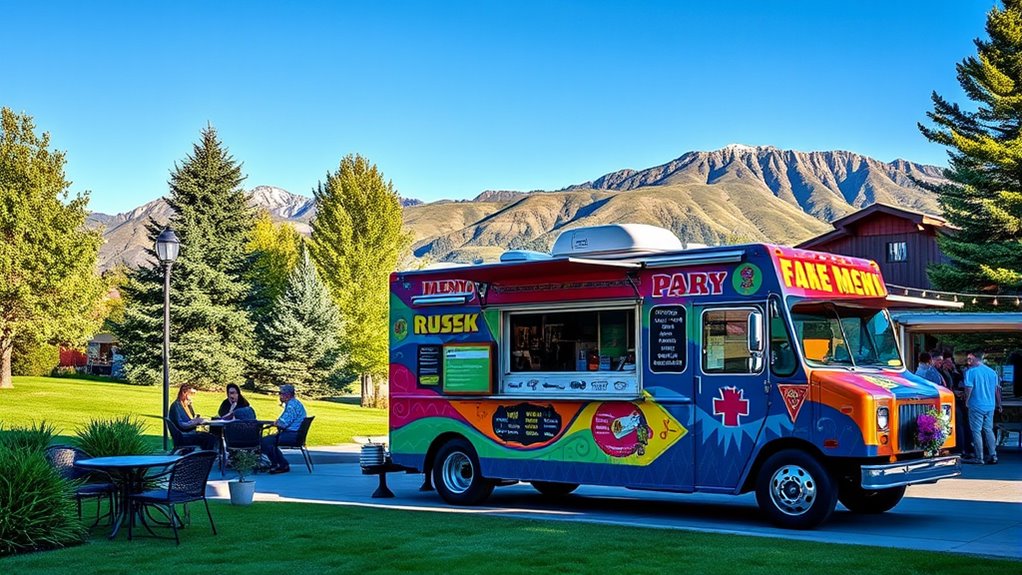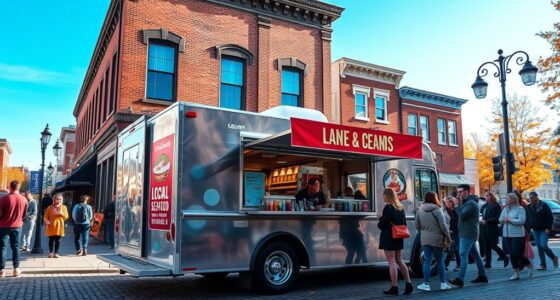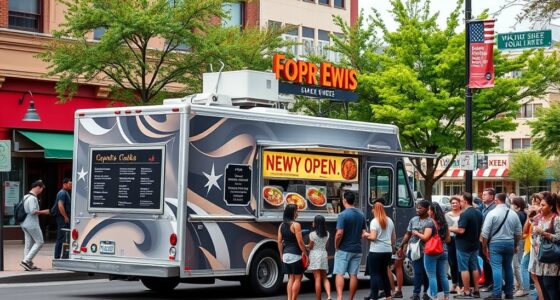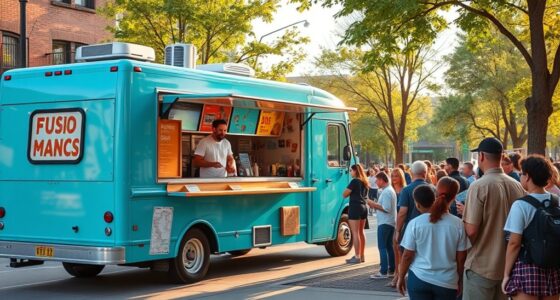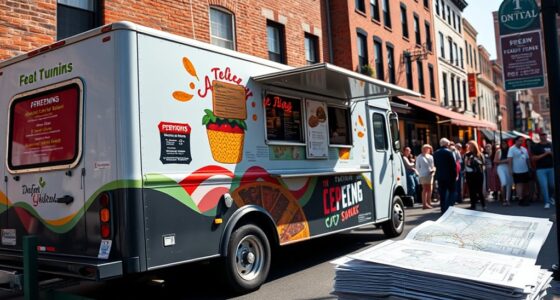To open a food truck in Park City, Utah, you’ll need to get permits like a Mobile Food Business Permit, health inspections, and a business license. Expect startup costs from $30,000 to $200,000, plus monthly expenses for fuel and staff. Focus on approved locations such as City Park and Quinn’s Field. Develop a compliant menu, engage in local marketing, and follow safety practices. Continue exploring these steps to turn your food truck dream into reality.
Key Takeaways
- Obtain necessary permits including health, business, fire, and mobile food permits through Bear River Health Department and local authorities.
- Budget $30,000–$200,000 for startup costs and plan monthly expenses such as fuel, maintenance, labor, and inventory.
- Operate at approved locations like PC MARC, City Park, and Quinn’s Field, ensuring compliance with site standards and city permits.
- Develop a compliant menu with safe preparation, use licensed commissaries, and adhere to health and safety protocols.
- Promote your food truck through local events, social media, and partnerships with nearby businesses to attract customers and build brand awareness.
Navigating Permits and Licensing Requirements
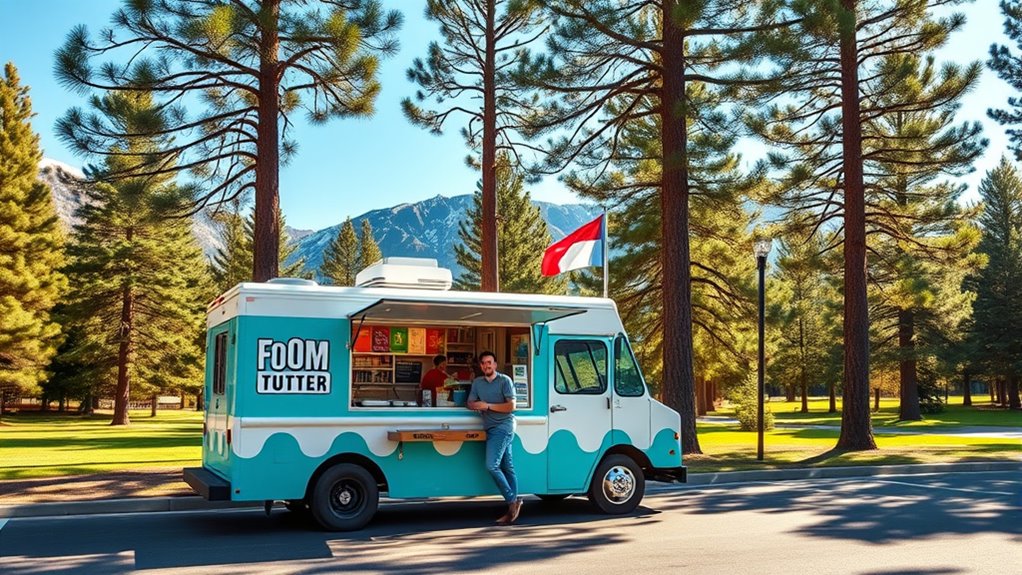
Understanding permits and licensing requirements is a crucial step to legally operate a food truck in Park City. First, you need to submit a Plan Review Application to the Bear River Health Department, which approves your truck’s design, equipment, menu, and vending details. All employees must hold Food Handler Permits, and at least one manager needs a Food Safety Manager Certification to meet food safety standards. You’ll also require a Commercial Business License specific to Park City or your local jurisdiction. After passing health inspections and submitting documentation, you can obtain a Mobile Food Business Permit. Additionally, if you use LPG or generators, you must secure the appropriate fire permits. Keeping all licenses current and on file with local authorities is essential for ongoing compliance. Proper licensing ensures legal operation and avoids penalties. Staying informed about local regulations and updates can help maintain compliance and prevent disruptions.
Understanding Costs and Fees for Operation
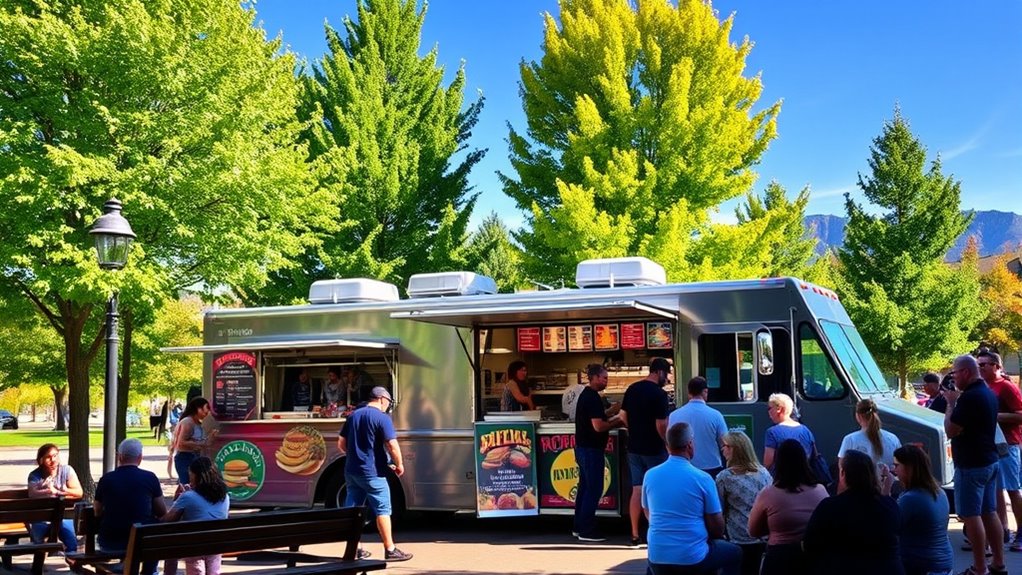
Understanding the costs and fees involved in operating a food truck in Park City is essential for budgeting and ensuring profitability. Your initial investment can range from $30,000 to $200,000, depending on truck condition and equipment needs. Monthly expenses include fuel ($300–$1,000), maintenance ($500–$1,000), labor ($6,000–$12,000), and inventory ($1,000–$5,000). Insurance costs about $2,000–$4,000 annually. Additional costs may include commissary fees, permit renewals, marketing, waste disposal, and unexpected repairs. To help you plan, here’s a breakdown of key costs:
| Cost Category | Range | Notes |
|---|---|---|
| Truck Purchase | $30,000–$200,000 | New vs. used |
| Equipment & Setup | $4,000–$20,000 | Kitchen appliances and tech |
| Monthly Operating | $8,000–$20,000 | Fuel, maintenance, labor, inventory |
| Insurance | $2,000–$4,000/year | Liability and property coverage |
| Variable & Misc. | Varies | Permits, marketing, repairs |
Additionally, it is important to account for regulatory fees that can vary significantly depending on local city and state requirements. Being aware of these regulations and permits can help prevent unexpected delays or fines.
Identifying Approved Locations and Site Standards

Park City has designated several locations where food trucks are permitted to operate, making it important for you to identify approved sites before setting up shop. Currently, six locations are approved: PC MARC, City Park, Bob Wells Plaza on Swede Alley, Silver King Coffee parking lot, Park City Ice Arena, and Quinn’s Field. These sites are selected based on foot traffic and community activity, with some, like PC MARC, operating seasonally due to weather. The city plans to rotate use among these locations to evaluate their viability and community response. Additionally, Summit County has updated policies to include regional areas. To operate legally, you’ll need permits, including a business license, health department approval, and fire permits, along with compliance with site standards and city inspections. Understanding permit requirements is essential to ensure your food truck operates smoothly within the regulations.
Crafting a Compliant Menu and Operational Protocols

To operate legally and guarantee customer safety, you must craft a menu and operational protocols that comply with local health regulations and city ordinances. Your menu should include only items that can be safely prepared and stored with your commissary and truck equipment. Since food preparation can’t happen solely inside the truck, using a licensed commissary kitchen for washing, cooking, and storage is essential. Remember, Utah law prohibits selling alcohol from food trucks. Your staff must handle ready-to-eat foods with gloves, tongs, or utensils, and your truck must have a minimum 30-gallon potable water tank. Additionally, implement procedures for managing delivery, loading, and supply storage, and ensure signage and noise levels meet city codes. Regular inspections will verify your adherence to these safety and operational standards. Recent legislation also requires food trucks to obtain a city business license, health permits, and pay local sales tax to operate legally. Ensuring your food safety compliance is up to date is critical for avoiding penalties and maintaining customer trust.
Implementing Effective Marketing and Safety Practices
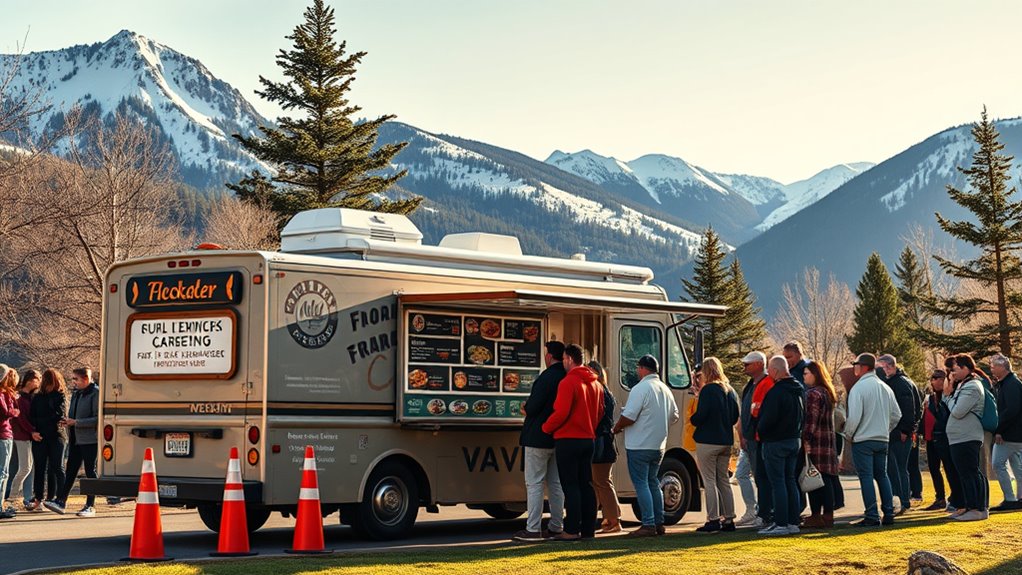
Implementing effective marketing and safety practices is essential for the success of your food truck in Park City. You should participate in local events, food festivals, and farmers’ markets to attract large crowds and build your customer base. Partnering with local businesses like coffee shops and breweries helps expand your reach. Use social media to showcase your menu, share updates, and run engaging campaigns or contests to boost visibility. Leverage food truck parks with high foot traffic to increase exposure. Safety is equally important: follow local health regulations, conduct routine vehicle inspections, and train staff on hygiene and emergency protocols. Secure all necessary permits, and maintain clear signage and sanitation facilities. Regularly updating your safety procedures and staff training ensures a thriving, compliant operation. Additionally, understanding local regulations and permits is crucial to avoid fines and ensure smooth operations. Combining smart marketing with safety ensures a thriving, compliant operation.
Frequently Asked Questions
How Long Does the Permit Approval Process Typically Take in Park City?
You’re wondering how long the permit approval process takes in Park City. Usually, it starts with an initial review within 2-3 days, but full approval can take several weeks. This timeline depends on how quickly you submit complete applications, pass health and fire inspections, and secure necessary agreements. Coordinating with multiple departments and resolving any issues can extend the process, so plan accordingly for a few weeks to make sure everything’s in order.
Are There Any Restrictions on Operating Hours for Food Trucks?
You might think operating hours are flexible, but in Park City, they’re tightly controlled—it’s like the city has a clock for everything! In commercial zones, you can work until 2 a.m., but in residential areas, you’re limited to 10 p.m.. Plus, noise restrictions and special event rules can further cut your hours. So, you’ll want to plan your schedule carefully to stay within these strict limits.
Can I Operate My Food Truck Year-Round in Park City?
You can operate your food truck year-round in Park City, but weather conditions may impact your schedule. Winter snow and cold temperatures might require you to adapt or take seasonal breaks. As long as you have the necessary permits, operate on approved properties, and follow state and local regulations, you can stay open throughout the year. Just plan for weather-related downtime and guarantee access to a commissary kitchen for year-round food prep.
What Are the Penalties for Non-Compliance With City Regulations?
You risk serious penalties if you don’t follow city regulations. Operating without proper permits or violating parking rules can lead to fines, permit suspensions, or even permanent closure. Health violations like not maintaining sanitary standards or handling food improperly could result in license suspension or fines. Additionally, damaging city property or failing to pay taxes might bring legal actions. Staying compliant keeps your business safe from costly legal and administrative consequences.
Do I Need Insurance to Operate a Food Truck in Park City?
Think of insurance as the shield protecting your food truck empire—you absolutely need it. In Park City, Utah, you’re required to carry auto liability, workers’ comp, and general liability insurance, naming the city as an additional insured. Without it, you risk fines, denied permits, and liability for accidents. So, always carry proof of coverage, and make certain your policies meet city and event requirements to keep your business rolling smoothly.
Conclusion
Now that you know the key steps to launching your food truck in Park City, the real challenge begins. Will your permits hold up under scrutiny? Can your menu stand out in a competitive scene? The right location and marketing strategy could make or break your success. Stay prepared, stay flexible, and keep your eyes on the prize—you’re about to turn your culinary dreams into reality, but the next move could be the game-changer. Are you ready?
